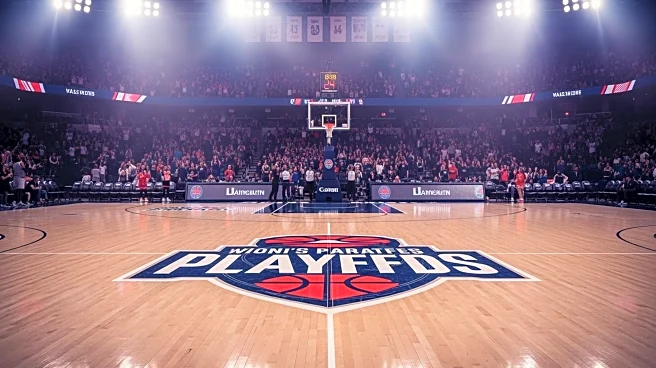What's Happening?
ESPN has announced that the 2025 WNBA playoffs achieved historic viewership numbers, marking the most-watched postseason across its networks. The playoffs averaged 1.2 million viewers, a 5% increase from the previous season. Game 1 of the WNBA Finals
between the Las Vegas Aces and Phoenix Mercury was particularly notable, drawing 1.5 million viewers, making it the most-watched WNBA Finals game in 28 years. Additionally, the 13 postseason ESPN WNBA Countdown episodes saw a 30% increase in viewership compared to 2024. However, the 2025 WNBA Finals were the second-most-watched on ESPN networks, trailing the 2024 Finals between the New York Liberty and the Minnesota Lynx. The Aces' sweep of the Mercury in a best-of-seven series may have contributed to a drop in viewership after Game 1.
Why It's Important?
The increase in viewership for the WNBA playoffs signifies growing interest in women's basketball, which could lead to greater investment and sponsorship opportunities for the league. This trend is crucial for the WNBA's growth and visibility, potentially influencing public perception and support for women's sports. The ratings success also highlights the impact of star players like Caitlin Clark, whose injury-plagued season affected overall interest. The league's ability to maintain high viewership despite such challenges suggests resilience and a solid fan base. This could encourage networks to continue or expand their coverage, further boosting the league's profile.
What's Next?
Looking ahead, the WNBA may focus on strategies to sustain and increase viewership, particularly by leveraging star players and competitive matchups. The league might explore marketing campaigns or partnerships to enhance its appeal. Additionally, the health and performance of key players like Caitlin Clark will be crucial in maintaining audience interest. As the league prepares for the next season, stakeholders will likely assess the impact of these ratings on future broadcasting deals and sponsorships.
Beyond the Headlines
The WNBA's viewership success could have broader implications for gender equality in sports, challenging stereotypes and promoting women's sports as viable entertainment. This shift may influence cultural perceptions and inspire young athletes, contributing to a more inclusive sports environment. The league's ability to attract viewers despite challenges underscores the potential for women's sports to thrive alongside their male counterparts.














